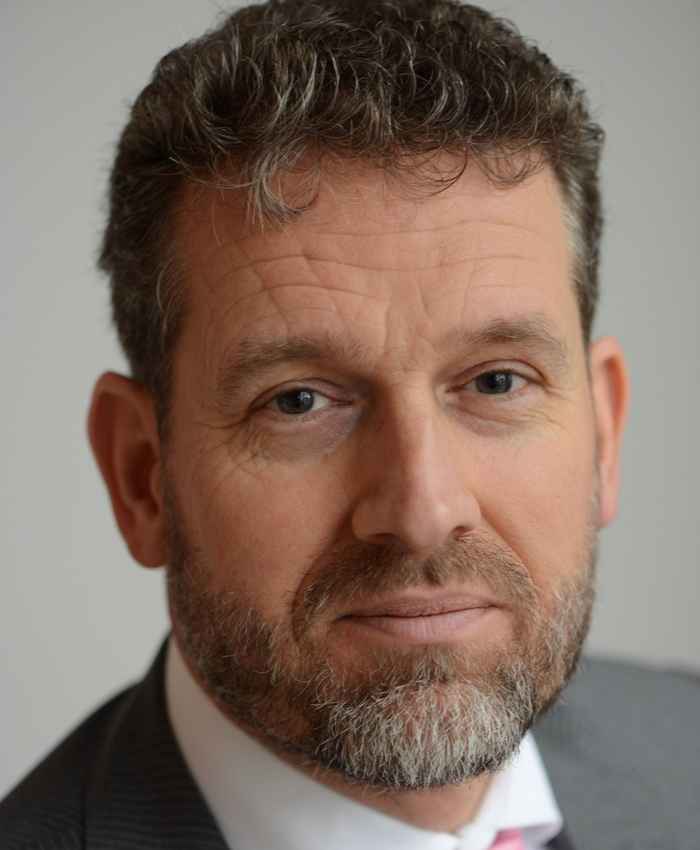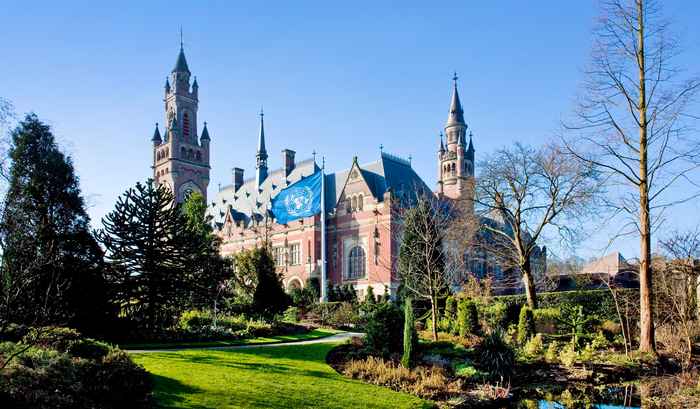'Legal rules are beautiful'
Interview with Erik de Baedts, director of the Peace Palace
30 August 2022

When you arrive at the Peace Palace in The Hague, you are bound to see tourists taking selfies in front of the fence. No wonder, because it is a beautiful building. Inside, it looks even more impressive, with high vaults, rich decorations and special gifts from many countries. It is truly a palace. Erik de Baedts shows the portrait of Andrew Carnegie, the philanthropist who financed the Peace Palace. At the end of the 19th century, Carnegie was the richest man in the world and decided to give all his money back to society. He wanted to invest in education, science, heroism and peace. When he was approached for money for the Peace Palace, he agreed on condition that a foundation was established to build and manage it. He also wanted a library to be set up in the field of international law and wanted the foundation to manage the Peace Palace in perpetuity. As director of the Carnegie Foundation, Erik is therefore also director of the Peace Palace.
The origins of the Peace Palace
In 1907, the construction of the Peace Palace in The Hague started as a result of the first world peace conference in 1899 at the initiative of the Russian Tsar Nicholas II. At the time, the Netherlands had an official policy of neutrality, so this first conference was held in The Hague at the Tsar's request to the young Queen Wilhelmina. The intention was that countries would no longer fight their battles on the battlefield, but peacefully in the courtroom. To this end, the Permanent Court of Arbitration is set up. In arbitration, both parties put their fate in the hands of arbitrators. They accept the resulting verdict in advance. The Permanent Court never goes public with these confidential matters.

A second court, the Permanent International Court of Justice, will be set up later in case either party does not want to arbitrate. In that case, a country can go to court if it is attacked. When the League of Nations is dissolved after World War II and the United Nations is founded in New York, the United Nations International Court of Justice is also housed in the Peace Palace.
Work Palace
On the way to the Japanese Room, which owes its name to beautiful Japanese tapestries, we pass the statue of Tobias Asser, the only Dutch winner of the Nobel Peace Prize. He was the Dutch negotiator during the peace conferences. With gifts to the Peace Palace, countries show that they support world peace. On the floor of the Japanese Room, there is a carpet from Turkey and in the corners there are cloisonné vases from China. The Japanese Room is actually called 'the room of the Administrative Council of the Permanent Court of Arbitration' and is often used for arbitrations. 'The mission here is to resolve conflicts peacefully, and that is what happens in reality,' says Erik.
We cannot see the main courtroom, as during the visit a case is being decided by the International Court of Justice between Gambia and Myanmar on the treatment of the Rohingya people. It illustrates that the Peace Palace is first and foremost a working palace, where hearings take place on a daily basis. A subsequent press release from the International Court of Justice reveals that the Court may hear the case relating to Myanmar.
Fortunately, the importance of peace is now being realised more because of what is happening in the world. More must be contributed to peace and to the Peace Palace.
High work pressure in the organisation
As director of the Peace Palace, Erik works long hours. He has to ensure that everything runs smoothly, but also that, if possible, more external sources are drawn to support the Peace Palace. 'These are intensive days, with quite exciting relationships. The contribution of the Dutch state has not been indexed in recent years. In fact, we are getting less and less. While the courts are only becoming more important and developing more activities. Arranging more support with fewer financial resources creates a high workload in the organization. Ensuring that we get a budget again, both from known parties and perhaps from others, is an important part of my work.'
It is a challenge he faces. 'Fortunately, the importance of peace is growing because of what is happening in the world. There must be more contributed to peace and to the Peace Palace. The Ministry of Foreign Affairs is now working on this and I hope that it will be completed soon. That will mean a lot in terms of being able to support the courts properly, running the academy that is here for future lawyers and making the best use of the space for all kinds of peace activities to bring parties together.'
French, European Studies and Law
Erik likes to think back to the lessons in international law at the UvA. 'Legal rules are beautiful. Look at the UN Charter, the first principles about the equality of peoples. Look at the Universal Declaration of Human Rights. If you know how to guarantee everyone's right to their own life and convictions, you are well on your way.'
Erik started his studies at the UvA with a propaedeutic year in French, with the aim of switching to the new discipline of European Studies, a so-called Advanced study without a propaedeutic year of its own. 'There was some uncertainty: where would the alumni end up? That's why, in addition to European Studies, I started Law, which I eventually completed.' He graduated with a philosophical thesis on the legitimacy of European law.
Social commitment
Erik's father came from a Catholic family in Brabant and 'converted' to Joop den Uyl's social democracy to stand up for people who were less fortunate. 'I have always aimed to do something in my work with the social involvement that I inherited, and that was nurtured during my time at the UvA.' After his studies, Erik first started working in an advisory branch of Ernst & Young, which focused on representing the interests of various industries. 'I first wanted to learn how to work in an environment under pressure to make profits, and to develop in that way.'
Erik subsequently held various positions. For instance, at the Ministry of Economic Affairs as project leader for the liberalisation of the energy market. Subsequently, he worked for some time as Secretary of the Board at the International Institute of Social Studies (ISS). This 'development university' brings professionals from third world countries to the Netherlands to study for a Master's degree. In their home countries, they then apply the insight and knowledge they have gained to positions in government and social organizations. 'I was able to put my social commitment to good use here.'
In his next job, Erik works for a sector organization with a social purpose: the waste sector. 'Waste is a beautiful social product. We realised that waste and material streams go around the world, that an international strategy was needed and that we, as the waste sector, had to be more outspoken.' Erik is asked to become president of the newly founded European association and to stand as a candidate for the global waste association. He goes to the Copenhagen climate conference as the waste sector's first representative and is invited to take part in special workshops for the next summit in Durban. Together with his fellow board members, he succeeded in getting the waste sector named as a sector in which significant investments should be made in the context of sustainability. 'I got a better feel for the UN climate conferences and its governance. You see how decision-making mechanisms work.'
Dialogues between Christians and Muslims
Throughout his career, Erik also volunteers for various social causes and political parties. From the perspective of peaceful relationships, he started organizing dialogues between Christians and Muslims in Amsterdam. 'With young people, we read a passage from the Bible and a passage from the Koran on the same theme, accompanied by a theologian and an imam.' He was asked to become chairman of the council of philosophies and religions in Amsterdam. When he moved to Nijmegen, he took on the same role with the council there and the council made a big splash during Peace Week. 'Everyone is for peace, but what do you do about it yourself? Thanks to these activities, I was able to demonstrate during the application procedure for the director of the Peace Palace that I had already dedicated myself to peace.'

Working for peace
Seven years ago, there is a newspaper cut-out from his father in the post: 'Erik, something for you?' It was the vacancy for the director of the Peace Palace. During the recruitment and selection procedure, Erik emerged as a suitable candidate: 'Of course I speak French and English. I have experience in advocacy for the Dutch government. At ISS I focused on Hague academic coalitions, so I was familiar with the institutions in the Peace Palace. I have a legal background, which is important when supporting the courts. And I have management experience, which I need as a director. I am grateful that I can work for peace here, in a very complex environment, though.' In the future, Erik wants to continue working on peace, sustainability and freedom of religion. 'Working on those kinds of projects is where my heart lies.'